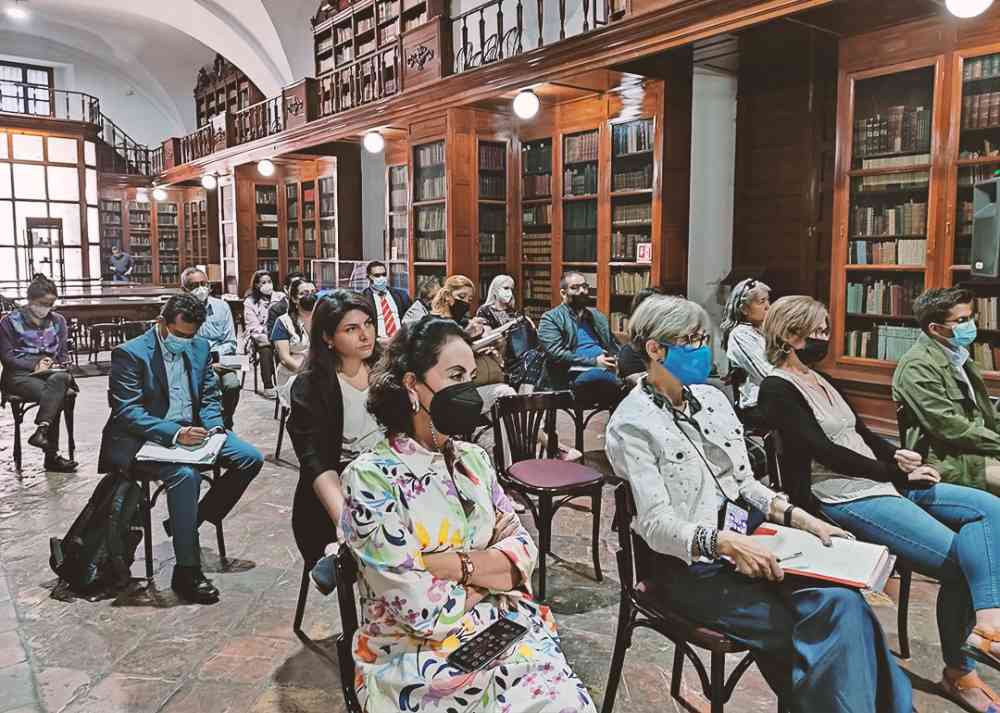Colloquium in Puebla, Mexico “New trends in management of heritage documentary collections”

El 18 y 19 de mayo de 2022, se llevó a cabo en la ciudad de Puebla, México, el Coloquio Nuevas Tendencias en Gestión de Colecciones Documentales Patrimoniales organizado por la Biblioteca Histórica José María Lafragua de la Benemérita Universidad Autónoma de Puebla y el Departamento de Biblioteconomía, Documentación y Comunicación Audiovisual de la Universidad de Barcelona. El evento se realizó de forma híbrida, con audiencia presencial en la sala de lectura de la Biblioteca Lafragua y con audiencia en línea, en tiempo real mediante la plataforma de conferencias virtuales Zoom y también a través de tranmisión en vivo en el canal de Youtube de la Biblioteca. Los temas abordados aunado a los conferenciantes atrajeron a personas de diversos países de América Latina.

The primera parte del coloquio inició con una breve descripción del proyecto CODICIS, a cargo del doctor Francisco Rizo Patrón de la Universidad Católica de San Pablo (Perú). A continuación, la maestra Mercedes I. Salomón Salazar, Directora de la Biblioteca Histórica José María Lafragua, hizo una introducción a los temas que se abordarían en los dos días del evento. Seguido de lo cual, se abrió un muy fructífero diálogo con personas que han tenido interesantes experiencias como gestores de colecciones documentales patrimoniales, diferentes cada una, pero que contribuyeron a que el público comprenda el gran reto que tenemos en México para mantener vivas muchas colecciones documentales, muchas de ellas sostenidas por una intensa labor altruista.

En esta mesa participaron: Román Moreno Soto, Coordinador del Centro de Documentación del Centro Nacional para la Preservación del Patrimonio Cultural Ferrocarrilero; Alejandro Serrano Núñez de la Biblioteca de la Congregación del Oratorio de San Felipe Neri; Belem Oviedo Gámez, Directora del Archivo Histórico y Museo de Minería, A.C.
El primer día cerró con la conferencia magistral de la Dra. Carina Rey, Profesora titular del Departamento de Biblioteconomía, Documentación y Comunicación Audiovisual de la Universidad de Barcelona donde abordó justamente el tema de las nuevas tendencias en gestión de colecciones documentales con valor patrimonial.

The segunda parte del Coloquio (19 de mayo) inició con la conferencia magistral de la Dra. Glòria Pérez-Salmerón, presidenta de la Fundación de Bibliotecas Globales de Stichting así como Miembro honorario y Presidente de la IFLA (2017-2019). Ella presentó el tema “Bibliotecas, bibliotecarios y compromiso social”, llevando a la audiencia a una reflexión importante de la labor de las colecciones patrimoniales de apoyar los Objetivos de Desarrollo Sostenible de la Organización de las Naciones Unidas.
Enseguida se presentó la conferencia “Análisis comparativo de la legislación en materia de protección patrimonial en tres países: México, Bolivia y Perú”, la cual estuvo a cargo de Edgar Iván Mondragón Aguilera y Christian Sánchez Pozos, responsables, respectivamente, de Proyectos y de Catalogación de la Biblioteca Lafragua. Con esta intervención, se presentaron parte de los resultados del trabajo realizado durante el primer año de trabajo del proyecto CODICIS. Varios colegas bibliotecarios apoyaron aportando información valiosa para poder hacer un Estado del Arte no solo en cuestión de legislación, sino también en cuanto a formación y capacitación del personal, conservación, restauración, digitalización, catalogación y clasificación.

El evento concluyó con la segunda intervención de la Dra. Carina Rey, en donde abordó el tema: “Una mirada sobre los valores de la biblioteca” mediante la cual compartió con la audiencia muchas estrategias de marketing y branding para mejorar el posicionamiento de archivos y bibliotecas. Muy interesante fue la reflexión que planteó respecto de que directivos y altos funcionarios estuvieran presentes en este tipo de eventos para comprender y poder apoyar de mejor manera las necesidades, metas y misión de las instituciones que están bajo su gestión a un mayor nivel.
Para aquellas personas que no pudieron participar, aún pueden escuchar las conferencias en los hipervínculos incluidos en este texto que los remiten al canal de:
Share on:
